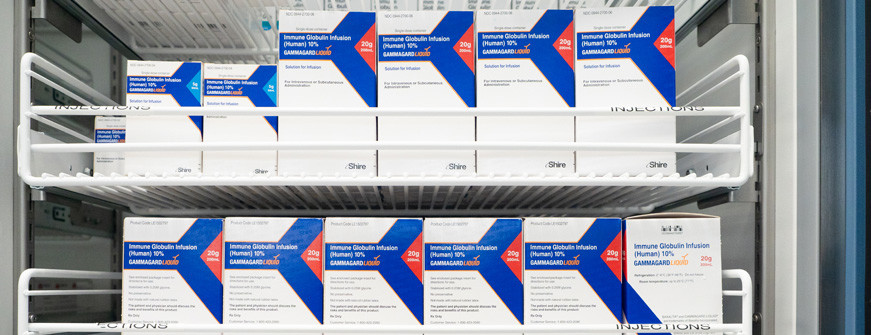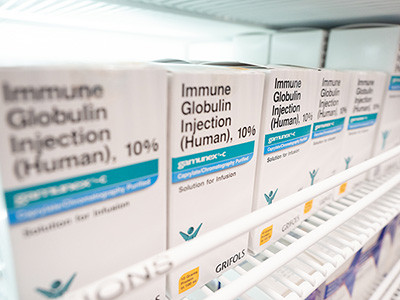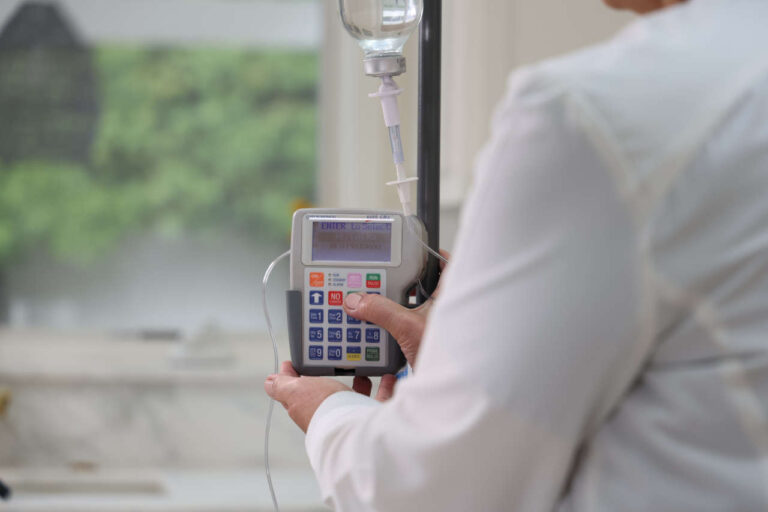
Immune globulin infusion (IVIG Infusion) is an IV-based treatment designed to help patients with weakened immune systems. IVIG treatment delivers antibodies directly to patients through the vein to fight off infections and inflammation. IVIG may produce mild to more severe side effects.
Immune globulin can be administered intravenously (IVIG) or subcutaneously (SCIG). If you have recently been approved for IVIG treatment, you may be curious about the potential side effects you may experience. Learning about what to expect after your IVIG treatment can help you decide if this treatment is right for you.
Speak to a Specialist
About Copay AssistanceWhat Does IVIG Treat?
IVIG is a treatment that uses antibodies donated from healthy individuals to boost the immune system. It treats a variety of conditions, which include:
- Kawasaki disease
- Vasculitis
- Lupus
- HIV
- Guillain-Barré syndrome
- Chronic inflammatory demyelinating polyneuropathy (CIDP)
- Myasthenia gravis
- Dermatomyositis and polymyositis.
- Idiopathic thrombocytopenic purpura (ITP)
- Chronic motor neuron disease
- Multifocal motor neuropathy
IVIG can also be used in transplant patients to reduce the likelihood of organ rejection.
How Does IVIG Work?
The exact mechanism of action of IVIG is not entirely understood. However, it is believed that because IVIG delivers a high dose of healthy antibodies into the patient, these antibodies help fight infections or neutralize harmful antibodies that may be attacking your body.
IVIG’s mechanisms are multifaceted and involve more than just neutralizing harmful antibodies. They also include immune modulation, interference with antigen presentation, and anti-inflammatory effects.
These combined actions contribute to IVIG’s ability to calm down an overactive immune system.
IVIG Treatment Side Effects
Although most recipients of IVIG handle the treatment quite well, some people do experience side effects.
Common Side Effects:
- Fever
- Headaches
- Aching muscles
- Nausea
- Stomach pains
Some may also experience an allergic reaction, typically caused by the added stabilizers and other inactive ingredients in the IVIG formula.
Ask About IVIG Home Infusion
Rare Side Effects:
- Aseptic meningitis (inflammation of the brain)
- Liver problems
- Kidney failure
- Hemolytic anemia (a condition that destroys red blood cells)
- Hives
- High or low blood pressure
Premedications such as aspirin and Benadryl are often administered before the infusion to address these known side effects. You may also be given medications to alleviate the symptoms after your treatment session. These medications include:
- Acetaminophen or Ibuprofen to relieve headaches and fever symptoms, including high body temperatures and body aches.
- Anti-nausea medication to help with nausea and vomiting
- Benadryl when there are anaphylactic symptoms, such as hives, rashes, and shortness of breath
Additionally, administering the immune globulin at a slower infusion rate may help prevent or lessen the severity of these side effects.
Headaches are among the most common side effects of IVIG. Hydration is important to prevent or manage this side effect. Many providers recommend drinking 8 cups of water starting 1 – 2 days before IVIG, the day of the infusion, and for 1 – 2 days after IVIG treatment.
Experienced infusion centers and nurses will often take precautions to prevent or help minimize any side effects before beginning treatment. At Ameripharma®, we have experienced and caring nurses who work hard to ensure your comfort and safety. Many patients don’t realize IVIG infusions can be done from the comfort of their home and may be covered by medical insurance. Be sure to contact us if you are interested in exploring these options.
Logging Your Symptoms and Side Effects

Ig is created from the extracted antibodies of thousands of blood donors, and each manufacturer produces the end product with its own unique blend of stabilizers and liquids.
Because of these variables, your body may respond differently during each infusion session.
It is important to note how your body feels between your infusion sessions. This can help your doctor prescribe the best course of treatment to support your needs. If you experience weakness between your IVIG infusion sessions, your doctor may recommend switching to SCIG.
Many patients may experience no side effects, while others may experience mild to moderate side effects. Logging and sharing the side effects (or lack thereof) that you experience after each infusion will allow your doctor to adjust your regimen.
Get Financial Assistance
Adjusting Your Regimen Can Include the Following:
- Slowing down your infusion rate
- Trying an alternative brand
- Switching to SCIG
- Adding pre-medications or hydration
These can all affect how your body responds to the infusion, and understanding how these factors come into play can help you prepare for future treatments.
How Often Will I Need IVIG Treatment?
According to the Immune Deficiency Foundation, half of the infused immune globulin is metabolized within a 3 to 4 week period.
Since IVIG is meant to infuse larger volumes of Ig, patients can normally go 3 to 4 weeks between treatments.
SCIG, on the other hand, delivers smaller volumes of Ig that have a slower rate of absorption. SCIG is given at more frequent infusion intervals ranging from daily to weekly.
When Can I See Results?

IVIG patients often begin to see results anywhere from several weeks to months after beginning treatment.
During this time, your doctor will monitor your progress to determine if your symptoms improve with treatment.
Conclusion
Many patients may experience no side effects, while others may experience mild to moderate side effects. Communicate with your healthcare professionals regarding any discomfort or concerns that you may have. Regardless of the side effects, the benefits of IVIG and SCIG treatment generally outweigh any temporary discomfort you may experience. Feel free to book a call with a specialist if you have any questions. Copay assistance is also available, so be sure to contact us if you are interested in receiving financial assistance.













